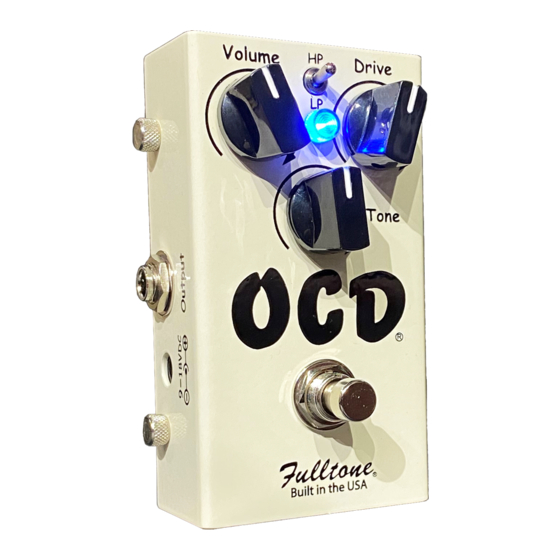
Advertisement
Table of Contents
Congratulations on your purchase of the
Version 2
The Fulltone Obsessive Compulsive Drive (OCD) is an extremely open sounding Overdrive/Distortion circuit that differs from other
overdrives in that it has a good bit more Dynamic-Range...meaning the difference between picking soft or picking hard will actually yield a
more natural and wider range of distortion (with less compression) than traditional diode-clipped overdrives. The OCD also creates
complex overtones without changing the inherent tone of whatever amp and guitar you're playing through, in the process lifting off that
blanket other drive pedals can put on your signature sound.
The OCD accomplishes its tube-like distortion through the unusual combination of overdriving its JFET opamp, and then hard-clipping with
a pair of MOSFETs later on in the circuit. This topography did not exist in a pedal prior to the OCD, and the circuit works very well with a
vast array of guitars and amps. Because of its large amount of available output volume, the OCD works great as a booster in front of amps
to goose them into submission, as well as through Master-Volume amps to drive them much harder than most OD's can, but it also excels
at creating its own distortion with all the chime of a Class A amp and its complex array of overtones. The OCD gives you the feeling that
your amp is Cranked at even living room volume so Clean playing is more dynamic and dirty sounds still have the ringing overtones. The
OCD's can access a slew of other in-between sounds by simply turning up or down your guitar's volume control, in fact, no other pedal
"cleans up" like the OCD. Try it at 18VDC and you get another level of dynamic range and clarity. I recommend using the Fulltone IPS-18 for
18volt operation (for use in all countries) as it is regulated and dead-quiet. Avoid other "switching type" power supplies, as we get a lot of
reports that the majority of them hum or create strange synth-like noises. Ours is quiet.
There are a lot of OD's comparing themselves to and stealing from the Fulltone OCD, and that's to be expected when you're the best selling
handmade overdrive of all time. There are many out-and-out clones of the OCD, and that's some form of a compliment I suppose, but I'd
like to personally thank you for buying and supporting the original...the one and only OCD.
This final version of the OCD (V2) has some exciting improvements over previous versions:
Class-A wired JFET input raising the impedance from all previous OCD version's 330K to 1 Mega ohm, thus interfacing better with all types
of pickups, isolating the input from everything coming before the OCD in your signal chain, and giving the pedal more touch-sensitivity
than any other OCD version, or any other pedal for that matter.
Buffered output completely isolates the the pedal from the influence of everything following it in the signal chain and allows much more
sustain and overtones than previously OCD's, even at lower distortion settings.
Internally selectable "True-Bypass" (TB) or "Enhanced Bypass
" (EB) switching. EB, a Fulltone innovation, is a vast improvement over the
TM
industry-standard, dynamic-robbing unity-gain JFET or Bi-Polar buffers used by other companies. Fulltone's EB doesn't have the out-of-
phase issue and tone-loss inherent with most circuits either. True-Bypass was great back when we were only using a few pedals.
But things have changed. Simply placing the V2 OCD (bypassed, in EB mode) in your signal path will recoup all of the lost tone and picking
dynamics that standard buffered & TB pedals and cables cause.
Regards,
Michael Fuller/ Product Designer & President of Fulltone
2017 FMP Inc. All Rights Reserved
Advertisement
Table of Contents

Summary of Contents for Fulltone OCD
- Page 1 The OCD accomplishes its tube-like distortion through the unusual combination of overdriving its JFET opamp, and then hard-clipping with a pair of MOSFETs later on in the circuit. This topography did not exist in a pedal prior to the OCD, and the circuit works very well with a vast array of guitars and amps.
- Page 2 To access the battery remove all four Thumbscrews from the sides of the pedal and pull the housing apart. Replace battery, put housing back together and re-tighten all four screws. Unplug guitar cable from INPUT when not in use to prolong battery life but If you have an adapter plugged in to the DC outlet of the OCD there is no need to unplug the guitar cable from the INPUT because our DC outlet is True-Bypass and disconnects the battery supply line, thus keeping the battery fresh.















Need help?
Do you have a question about the OCD and is the answer not in the manual?
Questions and answers